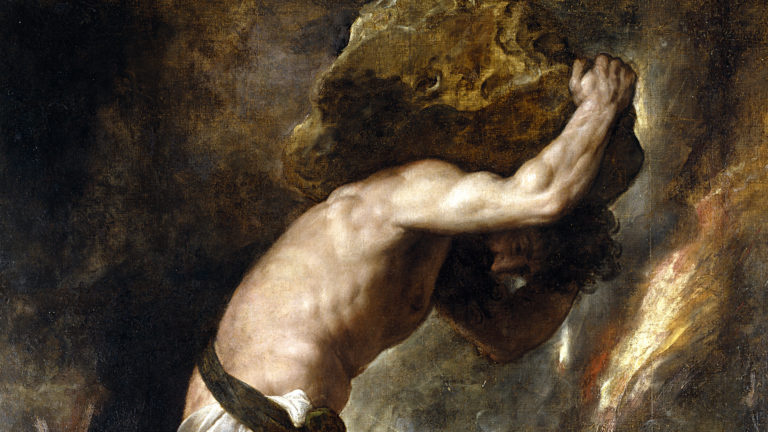“Life is pain, highness. Anyone who says differently is selling something.”
-William Goldman
Most people are familiar with the ancient Hellenic myth of Sisyphus. Sisyphus, deceitful and a trickster by nature, twice cheated death and, in doing so, incurred the wrath of Zeus. The Father of the Greek gods, Himself a Hellenisation of Dyḗus ph₂tḗr (whom we shall discuss later) cursed Sisyphus with an eternal Herculean version of Chinese water torture.
“Then I witnessed the torture of Sisyphus, as he wrestled with a huge rock with both hands. Bracing himself and thrusting with hands and feet he pushed the boulder uphill to the top. But every time, as he was about to send it toppling over the crest, its sheer weight turned it back, and once again towards the plain the pitiless rock rolled down. So once more he had to wrestle with the thing and push it up, while the sweat poured from his limbs and the dust rose high above his head.”
(Odyssey, Book 11:593)
At first glance this torture seems incredibly terrible, and no doubt it was. To be inches away from freedom time after time, only to be crushed under the weight of not only the stone but also the realization that this would be his eternal fate, could make a nihilist of any man. However, I have come around to take a different reading from Sisyphus’s curse.
Sisyphus is all of us.
We all try to cheat death in our deceitful and trickster ways. Some barricade themselves behind liquor cabinets, some build high walls of great fortune and fame, others lean on the everlasting arms of their understanding of the divine, still others seek younger women in full bloom of beauty in an attempt to discover what Ponce De Leon never could. Regardless of our tactics, regardless of how often we cast the thought aside, we all will die.
We all must die.
And hence the necessity of the stone.
Every man, sooner or later, has to come to a sense of understanding about his mortality. In youth, a man feels invincible. Death is an abstract concept that spares most (if not all) of his peers. It seems to him to be almost an impossibility, the domain of the weak and the sick and the old. As he grows older, the thought of death germinates like a weed in his consciousness. As his body aches and no longer works in the way it once did, that death-weed creeps its tendrils through more and more of his thinking life until it pops up all throughout the once-unbreakable concrete of his confidence.
This realization arrives to different men at different times. Some men face death in the fog of war or a traumatic accident, only to be spared by the fates to meet it at a later date. Others voluntarily face death through plant-assisted shamanic spirit work, as has been the case for me, as well as by becoming students of philosophy and/or meditation. The final category, the saddest of all, avoids all thought of it until it arrives at their door to find them unprepared for their final visitor.
Regardless of when the realization dawns across a man’s mind, this dawning awakens the judgement of Zeus: the punishment of pushing the awareness of one’s mortality up the hill of each new day for the rest of his days. The understanding of death, different from an abstract awareness of it, is in itself an act of initiation into death.
The wise man accepts and is humbled by this existential burden. The foolish man fights it to no avail.
The wise man accepts that this is indeed the judgement of his metaphysical Father. In that acceptance, he resigns himself to the task ever before him and determines to learn from the stone. As he pushes it, wrestles against it, does it not make him a little stronger with each attempt? Does he not learn the weight of the stone and how better to push it? Does he not learn the limitations of his own body and how by moving it more efficiently his task is made easier? Does he not build within his mind an ever-increasing fortitude to complete this endless task to his best ability?
Life is a road in a desert of suffering, with the occasional oasis of joy and fortune, that terminates at the river Styx and crosses over into the shadowy domain of Hel.
Each man, once initiated into death, is charged with pushing the stone. The stone itself is neither good or bad, vindictive or benevolent. It is a stone. Perhaps even a stone-cold fact. Its meaning is given only by the man charged with pushing it. His happiness, anger, defeatedness, or triumph is his choice alone. The stone, and how he chooses to view it, is in his hands alone.
In your hands alone.
Dyḗus ph₂tḗr, from whom Zeus is derived, is the name of the Proto-Indo-European Sky Father, represented by the Sun. The same Sun that marks one day from another. One pushing of the stone to the top of the hill to the next. Like any good father, He gives us this burden not to crush us, but to build us.
Imagine how weak and alienated the Boy Named Sue would have been if his Father had given him another name. It was his Father who cursed him with “that awful name” that was responsible for “the gravel in his gut and the spit in his eye.” This “curse” made Sue a man, despite his name. His name was something he couldn’t change. What he made of it was.
In a similar manner, our Skyfather has given us a similar curse and we must rise to the same challenge. A life of comfort and leisure never made a hero. A hero is a man who wrestles, time and time again, and remains undefeated until his Spirit is finally spilled from out of his mortal vessel.
If we aspire to the Solar ideal, we must accept the stone’s ordeal. We must remember our death with neither fear nor anticipation but with acceptance. We must then make useful the days between now and then. We must rise, like our Heavenly Father, above the dark clouds of this chaotic and terrified age. We must radiate wisdom, justice, temperance, and bravery. We must shine forth with strength, courage, mastery, and honor. We must fix our gaze on that most holy Sol Invictus, our Unconquered Sun, and become blinded to the material concerns of a material world.
Our quest is a spiritual one. Our cause is a righteous one. Our aims are not cultural or political, they are eternal. A legion of men collectively pushing the stone, learning from and supporting one another while doing so, can effectively change their world.
Maybe even the world.
My brothers embrace your struggle, for from it you are made into a man. Accept and love your fate. Remember your death. Use each day wisely, for if you will learn to love pushing your stone, you will do anything.
You will rise each day with the Sun and rewrite the stars.

Benjamin Howes
Benjamin Howes is a graphic designer who writes and hosts podcasts as Oaks & Oaths.

